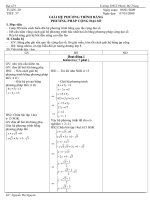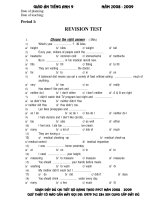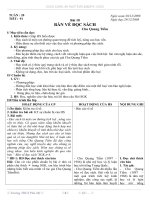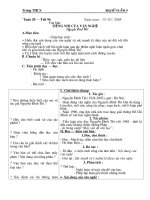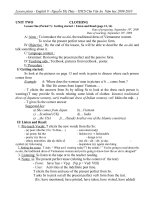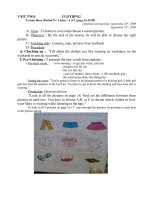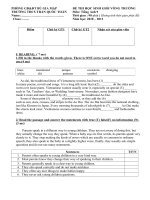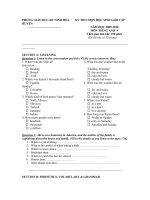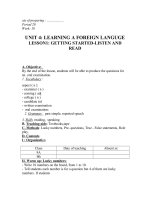Anh 9 Tuần 20
Bạn đang xem bản rút gọn của tài liệu. Xem và tải ngay bản đầy đủ của tài liệu tại đây (110.44 KB, 5 trang )
<span class='text_page_counter'>(1)</span><div class='page_container' data-page=1>
Date of preparing: 16/1/2021
<b>Unit 6</b>
<b>Period 39 Lesson 3: LISTEN</b>
<b>I.Objectives</b>
1. Aims: - By the end of this lesson, students can listen to the report on how our occeans
are polluted then complete the notes
- Revision of some adjectives and adverbs and “ adjective + that clause”
2. Skills: Practice listening, speaking, reading and writing skills.
3. Attitude: educate ss to protect the environment consciously.
<b>II.Teaching aids: tape & cassette</b>
<b>III.Method: PWP, PPP</b>
<b>IV.Contents</b>
<i><b> 1.Organization</b></i>
Class Date of teaching Absent ss
9D1 18/1/2021
9D2 19/1/2021
<i><b> 2.Warmer ( 4’ )</b></i>
+Hangman
- T follow steps of the “ hangman”
POLLUTION ( --- )
+Elicitation
? What can be polluted?
Pollution: - noise
- air
- land
- water: - lakes
- streams/ rivers/ seas
<b> - oceans - > ocean pollution</b>
<i><b> 3.New lesson</b></i>
* Pre-listening ( 6’ )
+Preteach
Translation
Translation
Translation
- T follow steps of teaching vocab
+Open prediction
? Look at yellow box P.50?
T: There is a report on how our oceans are
polluted. You are going to listen to it &
complete the notes
- T run through the notes, number the gaps
<b>I.Vocabulary</b>
-raw sewage ( n ) nước thải chưa qua xử lí
-waste materials (n)nguyên liệu thải trong
Cn
-pump ( v ) đổ ra
<b>II.Listen</b>
Prediction Listen
1
2
Raw sewage garbage is
</div>
<span class='text_page_counter'>(2)</span><div class='page_container' data-page=2>
and model, ask ss to predict
<b>* While-listening ( 10’ )</b>
+Correction
- Ss listen to the tape to check their
prediction ( put v/ x ) then compare with
partners
- Ss listen again & again to have the right
answers
-T get feedback from ss
( Tapescript P. 69 in T’s book )
<b>* Post-listening ( 7’ )</b>
+ Discussion
- T divide class into 4 groups ( each has a
secretary )
- T give a qts, ask ss to work in groups
discussing the ways to protect the
environment
- Each representative presents their ideas,
others commend and add more ideas
- T give feedback
<b>* Practice ( 5’ )</b>
?How is adverb formed? Where does an
adj/ adv stand?
? Look at exer 1 P.53?
- T elicit what to do from ss ( change adj
into adv then use the adv to complete the
sentences )
- Ss work individually then compare with
partners
- Ask some ss to call out the answers, ask
others to correct
<b>* Presentation ( 5’ )</b>
10
---Ba --- Dad
T elicit & model, ss repeat
? How is it formed? Stress? Meaning?
Use ?
3
4
sea
waste materials come
from factories
oil is washed from the
land
What should we do to protect our oceans?
- don’t throw trash onto the water
- reuse & recycle bottles
<b>Language Focus 1 P.53-54</b>
+Revision of Adj & Adv
Adj + ly - > Adv of manner
<i>Adj: goes before a noun, & after some </i>
verbs: be, look, appear, seem, feel, taste,
sound, smell,…
<i>Adv: goes after the direct object or after the </i>
verbs
Adjectives Adverbs
Extreme
Good
Happy
Sad
Slow
Extremely
Well
Happily
Sadly
Slowly
a. extremely b. slowly c. sadly
d. happily e. well
<b>Language Focus 3 P.55</b>
<i>Ba: Dad, I got mark 10 on my test.</i>
<i>Father: That’s wonderful. I’m pleased that </i>
you are working hard
</div>
<span class='text_page_counter'>(3)</span><div class='page_container' data-page=3>
<b> * Practice ( 6’ )</b>
- T run through exer 3
- Ss complete the dial using the words in
brackets in pairs - > pairs compare
- T get feedback from ss
( that clause: bổ sung, hình thành nghĩa
cho adj )
b. …excited that I can go to Da Lat this
time
c. ..sorry that I broke your bicycle yesterday
d…disappointed that you didn’t phone me
about it
e….amazed that I could win the first prize
<i><b> 4.Summary ( 1’ )</b></i>
- T summarize the listening, use of adj/ adv and “ that- clause”
<i><b> 5.Homework ( 1’ )</b></i>
- Write a short passage about how you do to protect our occeans
- Do LF 1, 3 again
<b>*Evaluation</b>
………
………
–––––––––––––––––––––––––––––––––––––––––––––––––
Date of preparing: 16/1/2021
<b> Unit 6</b>
<b>Period 40 Lesson 4: READ</b>
<b>I.Objectives</b>
1. Aims: By the end of the lesson, ss will be able to understand the poem and aware of
protecting the environment
2. Skills: Practice speaking, reading and writing skills.
3. Attitude: educate ss to protect the environment consciously.
<b>II.Teaching aids: book, posters</b>
<b>III.Method: PWP</b>
<b>IV.Contents</b>
<i><b> 1.Organization</b></i>
Class Date of teaching Absent ss
9D1 19/1/2021
9D2 20/1/2021
<i><b> 2.Warmer ( 3’ )</b></i>
+Chatting
? Do you like poetry? Can you write poems? Have you ever written poems?/ read an
English poem? Who is your favorite poet?
<i><b> 3.New lesson</b></i>
<b>* Pre-reading ( 10’ )</b>
+Preteach
Picture
Example
Synonym ( fence )
<b>I.Vocabulary</b>
</div>
<span class='text_page_counter'>(4)</span><div class='page_container' data-page=4>
Translation
Picture
- T follow steps of teaching vocab
+Rub out & remember
- T follow steps of ROR
+Prequestion
T: They are going on the picnic
- T give 2 qts, run through and ask ss to
predict the answers
<b>* While-reading ( 20’ )</b>
+Correction
- Ss read the poem & check the answers
individually - > compare with partners
- T get feedback from ss
+Matching
? Look at a, P.51?
- T run through, model
- Ss read the poem again to match a word in
A with an appropriate explaination in B in
pairs - > pairs compare
- T ask some ss to write their matching on
bb, others correct
+Comprehension Questions
? Look at b, P.51?
- T run through, ask ss to read the poem
again to answer the qts in pairs
- Ask some pairs to ask & answer before
class
- Others correct
<b>* Post-reading ( 10’ )</b>
+Write it up
? Write a short passage ( about 60- 70
words ) to answer the question: “ What
could you do to minimize pollution
-nonsense ( n ) điều dại dột, vô nghĩa
-foam ( n ) bọt
<b>II.The poem</b>
1. Who are they?
- They are the mother and her son
2. What’s the poem about?
- It’s about the environment
Exer a, P.51
1- c 4- e 6- a
2- g 5- d 7- b
3- f
Exer b, P.51
1. If the pillution goes on, the world
will end up like a second-hand junk yard
2. The mother thinks other folk pollute
the environment
3. If the boy keeps on asking such
questions, his mother will take him
home right away.
4. No. Because he is right: If he throws
the bottles that will be polluting the
woods
5. The poet wants us to learn that
everyone is responsible for keeping
the environment from pollution/
stopping pollution
6. Ss’ answer
Eg: Pollution is the hottest problem
nowadays. To minimize it we should carry
out the “ 3 R” plan.
- Firstly, we could reduce our garbage…
<i><b> 4.Summary ( 1’ )</b></i>
</div>
<span class='text_page_counter'>(5)</span><div class='page_container' data-page=5>
<i><b> 5.Homework ( 1’ ) - Complete the writing</b></i>
<b>*Evaluation</b>
</div>
<!--links-->
